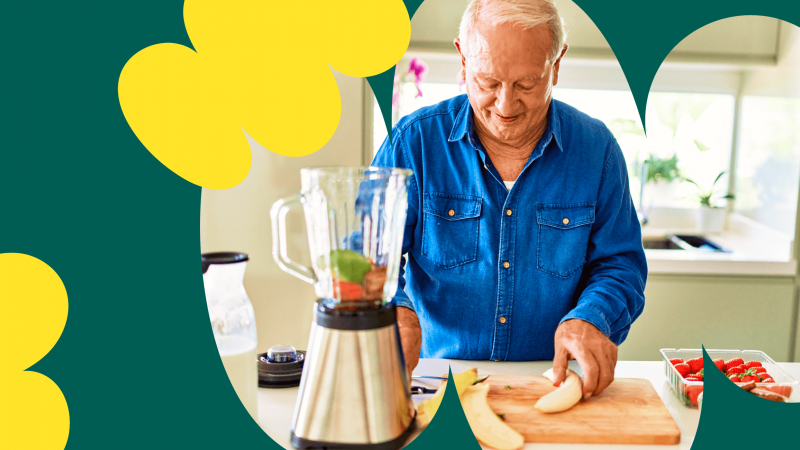
7 tips to creating resilience as we age
How to better adapt to change
We all know that change is an inevitable part of life. We move jobs, houses, even countries. As our children grow, they change constantly and before we know it, they’ve moved out and started their own lives.
The older we get, the harder it can be to adapt to change. We get comfortable in our home or job and enjoy the regularity of our routine. We’ve worked hard and now we want to enjoy what we have.
Of course, life doesn’t work like that, and sometimes change is forced upon us. Here we talk about the importance of adapting well to change, even in your later years, and how you can learn to be more resilient in various situations.
1. Embrace downsizing as a fresh start
Downsizing can be a daunting prospect. You’ve probably lived in your home for many years and it holds so many memories and happy times. However, if your home is big, you might find it hard to manage. The stairs could be a challenge and you may not get into the garden as often as you’d like.
Think about downsizing as an opportunity to simplify your life and declutter both your physical space and your mind. Take it as a fresh start to adapt to a changing environment and more manageable living environment. You could donate or pass on items you no longer need and focus on the cherished things that bring you joy.
2. Enjoy a new lease on life at home
Perhaps downsizing is too big of a change and you can still get by for now? That’s great! But perhaps think about whether there are any changes you can make to your living situation that could help you stay in your home for longer.
Use our home safety checklist to make sure it’s as safe as possible and easy for you to get around. You might consider things like grab bars, anti-slip mats or assistive technology so you’re safer and can do more things for yourself.
You might also want to consider getting some help at home. If the garden is getting too much, you may get someone to come in weekly to weed and mow. Or you could get some help with the cleaning or laundry. Think about it this way: by adapting to change and getting some help with all the boring chores, it will mean you will have the time and energy to do the things you love.
3. Retire with purpose
Retirement is a significant life change and is often viewed as the end of something. However, it can also be a time to rediscover your passions and interests that you perhaps haven’t had time for in the past.
Explore the hobbies you’ve always wanted to pursue. Have you always wanted to work with watercolours? You could book a workshop or a course.
Do you have a passion for yoga and love nothing more than spending your weekends doing the downward dog? Perhaps you could learn to be a yoga teacher.
Do you love meeting new people? You could volunteer at a local thrift store or another charity that needs help.
Retirement can be an opportunity to thrive, find your purpose outside of work and make a positive impact on your community.
4. Seek support during grief
Losing a loved one like a spouse is undoubtedly one of the most challenging changes we face as we age. When you’ve lived your life with someone, it’s incredibly difficult to cope with the change of negotiating the next phase on your own.
Grief is a natural process and it’s important to allow yourself to heal. Don’t sweep your feelings under the carpet. Allow yourself time to mourn your loved one and reach out to friends, family, and support groups who can provide a compassionate ear. By opening up, you can build new connections and help navigate this difficult time.
Healing takes time. One way to adapt to this significant life change is to seek professional help if you’re struggling to cope. Speak to your GP or visit Grief Australia for options.
5. Foster new social connections
Ageing often means you will experience a shift in your social circle, but it also offers opportunities to forge new social connections. You could join clubs, classes or community organisations that align with your interests. Attend social events or reach out to neighbours to build a support network.
When you’re open to change, you can build new relationships which can provide companionship, support and a sense of belonging for this phase of your life.
6. Adapt to changing physical mobility
One of the biggest changes you might face as you age is your body and its limits. Whether it’s an injury, illness or general decline, everyone experiences a change in the way they move at some point. Although things may be different, you can still adapt to change by prioritising your physical and mental health with a healthy lifestyle. You may not run 20km anymore, but can you swim, do yoga or cycle?
Fitness is incredibly important as we age and by being resilient, we can keep moving and maintain our health.
7. Celebrate the positives of ageing
Change can bring challenges, but we should also recognise the many positives of getting older. You’re wiser, more experienced, and have a deeper understanding of life’s complexities.
Celebrate everything you’ve achieved and look forward to the opportunities that lie ahead. Embrace the freedom to pursue your passions and enjoy the beauty of a life well-lived.
If you’d like to learn more about how we can help you embrace change as you age, get in touch. Our goal is to help our Members live happy and healthy lives in their own homes.
Learn more: How to make the most of your Home Care Package funds










